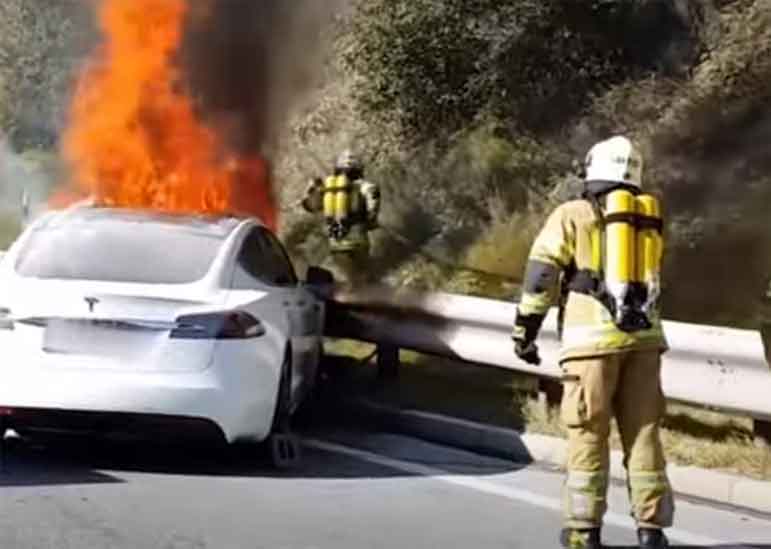
In an 11-second YouTube video, it displayed a modern four-door car cruising down a test track. The most important upgrade was the tagline emblazoned on the car's right side: "Powered By All-Solid-State Battery."
In recent years, car giants such as Toyota, Ford and Volkswagen have been trying to overcome the shortcomings of batteries that power electric vehicles by racing to produce a next-generation battery.
Many companies are rallying around solid-state batteries, which do not contain liquid electrolytes and can charge quicker, last longer and be less prone to catching fire than the lithium-ion batteries currently in use, according to battery experts. Automakers have poured millions into perfecting the technology by the latter half of the decade.
The contest comes at a crucial time. Gas prices have skyrocketed, and climate change has accelerated efforts to curb greenhouse gas emissions, increasing demand for electric vehicles. This has led to shortages of many minerals used in current electric-vehicle batteries, amid ethical concerns as they're often mined by adults and children in backbreaking conditions with little protection.
But experts and carmakers say getting the new batteries to market is an extremely challenging task.
"It's the technology of the future," said Eric Wachsman, director of the Maryland Energy Innovation Institute. "The question is: How soon is that future going to be here?"
For the past three decades, lithium-ion batteries have been king. They can recharge quickly and hold high amounts of power in a small package. Their benefits made them ubiquitous, fueling not just cellphones and electronic tablets, but pacemakers, operating room equipment and many other essential products.
But experts say their use in electric vehicles is limited. Lithium-ion batteries can't be charged too often, forcing drivers to ride on a single charge. They might also be reaching a cap on how much power they can store, scientists have noted. Because they are filled with flammable liquid electrolytes, they can also pose a fire risk, which led General Motors to recall their Chevy Bolt electric vehicle last summer.
These batteries also rely heavily on nickel and cobalt, which are facing supply shortages and rising in price. Cobalt, which is mostly mined in the Democratic Republic of Congo by adults and children who often inhale toxic chemicals and contract fatal lung diseases, has sparked a human rights crisis in the country.
Lei Cheng, a chemist and material science expert at Argonne National Laboratory, said there's "no doubt" that solid-state batteries will replace lithium-ion batteries in the future. The new batteries, which would replace flammable liquid electrolytes with a solid layer of graphite, could be safer, reduce dependency on nickel and cobalt, and hold more energy in a cheaper way, she said, making them alluring to car manufacturers.
"If you buy a nice Tesla car," she said, "the price is pretty much decided by what kind of battery you put in."
Major carmakers, knowing the drawbacks and costs embedded in current battery technology, are partnering with solid-state battery companies or conducting in-house research and development on the technology.
Volkswagen has invested $300 million in QuantumScape, a solid-state battery company also backed by Microsoft co-founder Bill Gates, aiming to bring the batteries to production by the middle of this decade. Ford and BMW led a $130 million investment round in a Colorado solid-state battery start-up called Solid Power, hoping to debut the technology around 2027. In January, Toyota announced it will put solid-state batteries in hybrid cars on dealership lots by 2025.
For Doug Campbell, the chief executive of Solid Power, the focus on solid-state technology has been a boon. In December, Solid Power went public and raised more than $540 million. Now, it is "hiring like mad" as it tries to meet its goal of getting commercially viable solid-state batteries into cars by 2027, Campbell said.
Campbell added that he is not surprised carmakers are flocking to the technology. With batteries accounting for 40% of an electric vehicle's cost and representing a key safety component, finding batteries that are cheaper, longer lasting and less flammable is one of the most crucial innovations for car manufacturers going forward.
"Solid-state is sort of that holy grail," he said.
Despite that, there are some worries about the technology. When announcing its plans to introduce solid-state batteries into hybrid cars by 2025, Toyota noted that they are not yet set to be used in fully electric cars. Gill Pratt, the company's chief scientist, said in January the batteries are currently too expensive to power a fully battery-operated car. He also noted that charging solid-state batteries repeatedly affects their overall life span.
"We want to start by putting them in [hybrid] vehicles where we believe that they're both the most well suited in terms of lifetime, but also that will exercise them sufficiently so that as costs continue to come down, we can roll them out in the future" in fully electric vehicles, he told the Autoline Network.
Wachsman, of the Maryland Energy Innovation Institute, noted that manufacturing these batteries will prove difficult. He said it is likely that solid-state batteries will first show up in other sectors where smaller quantities of the product are needed, pointing to the U.S. defense and aerospace sectors.
The challenge, Wachsman said, is that most lithium-ion batteries are made in China, which has perfected the manufacturing process, driving down costs.
But switching global production to solid-state batteries requires a different manufacturing process that would be harder to replicate at the same scale as that of lithium-ion batteries - which is likely to drive up costs in the short term.
"[Battery makers] are on a path to have commercial products within the next two years," he said. "The question will be whether or not they can scale."
(COMMENT, BELOW)


 Contact The Editor
Contact The Editor
 Articles By This Author
Articles By This Author